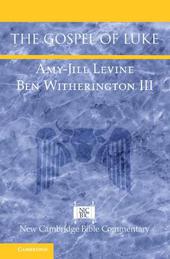
|
The Gospel of Luke
Paperback / softback
Main Details
Description
This volume offers a comprehensive overview of one of the four New Testament gospels and brings a unique approach to the genre of Bible commentary. Featuring distinct Jewish and Christian voices in respectful conversation, Amy-Jill Levine and Ben Witherington, III methodologically break new ground in exploring why scholars disagree on questions of history (what actually happened, what is authorial invention, how do we address different versions of the same account), literature (what does this story tell us about Jesus and Peter, Mary Magdalene and Judas, among other characters), and theology (what can we say about resurrection and divine justice, or about Jesus as the Messiah). They show how Luke has been used to create both tragedy and hope, as well as to promote sexism, anti-semitism, and religious intolerance, thereby raising important questions regarding ethically responsible interpretation. This volume will be essential reading for theologians, clergy, and anyone interested in biblical studies and Jewish/Christian dialogue.
Author Biography
Amy-Jill Levine is University Professor of New Testament and Jewish Studies and Mary Jane Werthan Professor of Jewish Studies at Vanderbilt and Affiliated Professor, Centre for the Study of Jewish-Christian Relations, Cambridge. Her numerous publications include the prize-winning volumes The Misunderstood Jew: The Church and the Scandal of the Jewish Jesus (2006), Short Stories by Jesus: The Enigmatic Parables of a Controversial Rabbi (2014), the edited 13-volume Feminist Companions to the New Testament and Early Christian Writings (2001), and the co-edited The Jewish Annotated New Testament (2011). Ben Witherington, III is Amos Professor of New Testament for Doctoral Studies at Asbury Theological Seminary, Kentucky and on the doctoral faculty at University of St Andrews, Scotland. Considered to be one of the leading evangelical scholars in the world, he is an elected member of the prestigious SNTS, a society dedicated to New Testament studies. Witherington has written over fifty books, including The Jesus Quest (1997) and The Paul Quest (2001), both of which were selected as top biblical studies works by Christianity Today. He also writes for many church and scholarly publications, and is a frequent contributor to the Patheos website.
Reviews'Amy-Jill Levine and Ben Witherington, III have written a unique commentary on Luke - the one I'll turn to first for the foreseeable future. The first major commentary [co-written] by a Jew and a Christian, it is thorough and engaging. The authors clearly explain their positions while engaging alternative perspectives, never losing sight of the theological implications of their work.' Greg Carey, The Christian Century 'This volume takes an interesting tack. Levine (Vanderbilt Univ.) and Witherington (Asbury Theological Seminary) stand at nearly polar opposites on the theological spectrum. The former is a Jewish feminist agnostic, whereas the latter is an evangelical Methodist. Both authors are noted scholars with rich background in the New Testament. Their collaboration provides a rich dialectic between a 'liberal' and a 'conservative.' Their aim is not to retrace the ground traditionally covered by NT commentaries - authorship, date, and so on - but rather to delve into the text for the benefit of scholars, pastors, and interested laypersons ... The commentary is accessible throughout, and the authors demonstrate their awareness of pertinent extra-biblical works that shed light on the text.' Choice 'In this volume, they join in what seems an unprecedented work of collaboration: an exegetical and theological commentary on a New Testament gospel by a Jewish feminist and a Methodist evangelical. While this alone makes it worth consulting, the commentary's value stands apart from the authors' legacies as an excellent work of careful exegesis, informed interpretation, and constructive interreligious dialogue.' Review of Biblical Literature '... L[evine] and W[itherington] have gifted us with a magnificent work that will stand as a hallmark of Lucan scholarship for some time to come.' Gary Gilbert, The Catholic Biblical Quarterly
|